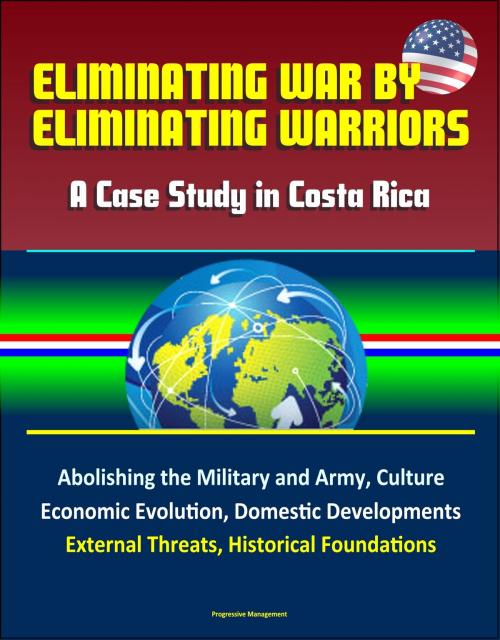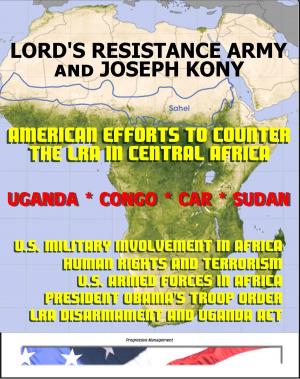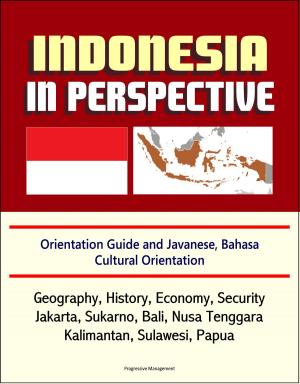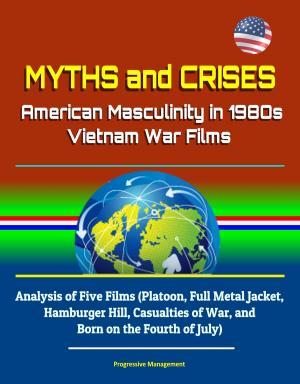Eliminating War by Eliminating Warriors: A Case Study in Costa Rica - Abolishing the Military and Army, Culture, Economic Evolution, Domestic Developments, External Threats, Historical Foundations
Nonfiction, History, Americas, Central America, Military, Strategy| Author: | Progressive Management | ISBN: | 9781370111473 |
| Publisher: | Progressive Management | Publication: | October 22, 2016 |
| Imprint: | Smashwords Edition | Language: | English |
| Author: | Progressive Management |
| ISBN: | 9781370111473 |
| Publisher: | Progressive Management |
| Publication: | October 22, 2016 |
| Imprint: | Smashwords Edition |
| Language: | English |
This excellent report has been professionally converted for accurate flowing-text e-book format reproduction. Armed conflicts have a destabilizing effect on individual nations and the international community alike. Conversely, reducing warfare has a positive effect on both national and international affairs. Stable nations equate to stable borders, which, in turn, improve cross-cultural communications and global commerce. This study uses Costa Rica as a case study to examine the efficacy of reducing armed conflict by eliminating individual national forces. The key to promoting peace through abolishing the military lies in four elements: culture, economic evolution, domestic developments, and external threats. This paper relies on historical observations, legal mandates, cross-national comparisons, and third-party analysis to understand how Costa Rica has been able to abolish its army and maintain a successful military-free society. The four elements of culture, economic evolution, domestic development, and external threats appear in virtually every source, so this work analyzes each element in sequence as it relates to Costa Rica. Finding the proper mix of elements can help gauge which regimes will peacefully relinquish armed forces and thus contribute to peaceful globalization.
CHAPTER I - INTRODUCTION * CHAPTER II - COSTA RICAN CULTURE * A. RURAL DEMOCRACY * B. DECENTRALIZED LEADERSHIP * C. DESIRE FOR PEACEFUL COEXISTENCE * D. CULTURAL CONCLUSIONS * CHAPTER III - ECONOMIC EVOLUTION * A. HISTORICAL FOUNDATIONS * B. ECONOMIC TRANSITION * C. SOCIO-ECONOMIC ALTERATIONS * CHAPTER IV - DOMESTIC DEVELOPMENT * A. MILITARY COUPS * B. ANTI-COMMUNISM * C. DICTATORIAL REGIMES * D. SOCIAL ADVANCEMENT * CHAPTER V - EXTERNAL THREATS * A. REGIONAL THREATS * B. EXTRA-REGIONAL THREATS * CHAPTER VI - ALTERNATIVES TO STANDING ARMIES * A. MILITARY OPERATIONS OTHER THAN WAR * B. CRIMINAL ACTIVITY * C. NATIONAL POLICE * D. ORGANISMO DE INVESTIGACION JUDICIAL * E. NATIONAL MIGRATION POLICE * F. COAST GUARD * G. DISASTER RELIEF * H. TRANSIT POLICE * I. STATE SECURITY * CHAPTER VII - CONCLUSION
The following argues that Costa Rica's decision to abolish its armed forces was pursuant to the four elements named above, and this research focuses attention on each of these elements. This paper describes the alternatives to a standing army employed by Costa Rica to demonstrate how civilian organizations can assume the burdens of some military functions. Each of the four elements has its own additional factors, and each is connected to the others in the grander scheme of political science. The collaboration of these four elements along with unique aspects of Costa Rica's evolution has produced an ideal environment wherein an expeditionary force was neither necessary nor desired for their consolidated democracy.
That Costa Rica, or any other nation, would disband its armed forces is significant for both internal and external reasons. Domestically, nations create militaries that help to define the government's role in relation to its own people. The military can be a tool to unite the populace through shared responsibility (like compulsory military service), protect from foreign threats (like legally mandated self-defense forces), gain resources from other countries (as the metaphorical muscle behind extractive nations), or subjugate its own citizens (as has been seen in countless societies throughout history). In every scenario, the military establishes a link between the government and the governed. Therefore, any nation without a military has a non-conventional relationship between the civil-leadership and the people, and should be studied as an anomaly to the global norm.
This excellent report has been professionally converted for accurate flowing-text e-book format reproduction. Armed conflicts have a destabilizing effect on individual nations and the international community alike. Conversely, reducing warfare has a positive effect on both national and international affairs. Stable nations equate to stable borders, which, in turn, improve cross-cultural communications and global commerce. This study uses Costa Rica as a case study to examine the efficacy of reducing armed conflict by eliminating individual national forces. The key to promoting peace through abolishing the military lies in four elements: culture, economic evolution, domestic developments, and external threats. This paper relies on historical observations, legal mandates, cross-national comparisons, and third-party analysis to understand how Costa Rica has been able to abolish its army and maintain a successful military-free society. The four elements of culture, economic evolution, domestic development, and external threats appear in virtually every source, so this work analyzes each element in sequence as it relates to Costa Rica. Finding the proper mix of elements can help gauge which regimes will peacefully relinquish armed forces and thus contribute to peaceful globalization.
CHAPTER I - INTRODUCTION * CHAPTER II - COSTA RICAN CULTURE * A. RURAL DEMOCRACY * B. DECENTRALIZED LEADERSHIP * C. DESIRE FOR PEACEFUL COEXISTENCE * D. CULTURAL CONCLUSIONS * CHAPTER III - ECONOMIC EVOLUTION * A. HISTORICAL FOUNDATIONS * B. ECONOMIC TRANSITION * C. SOCIO-ECONOMIC ALTERATIONS * CHAPTER IV - DOMESTIC DEVELOPMENT * A. MILITARY COUPS * B. ANTI-COMMUNISM * C. DICTATORIAL REGIMES * D. SOCIAL ADVANCEMENT * CHAPTER V - EXTERNAL THREATS * A. REGIONAL THREATS * B. EXTRA-REGIONAL THREATS * CHAPTER VI - ALTERNATIVES TO STANDING ARMIES * A. MILITARY OPERATIONS OTHER THAN WAR * B. CRIMINAL ACTIVITY * C. NATIONAL POLICE * D. ORGANISMO DE INVESTIGACION JUDICIAL * E. NATIONAL MIGRATION POLICE * F. COAST GUARD * G. DISASTER RELIEF * H. TRANSIT POLICE * I. STATE SECURITY * CHAPTER VII - CONCLUSION
The following argues that Costa Rica's decision to abolish its armed forces was pursuant to the four elements named above, and this research focuses attention on each of these elements. This paper describes the alternatives to a standing army employed by Costa Rica to demonstrate how civilian organizations can assume the burdens of some military functions. Each of the four elements has its own additional factors, and each is connected to the others in the grander scheme of political science. The collaboration of these four elements along with unique aspects of Costa Rica's evolution has produced an ideal environment wherein an expeditionary force was neither necessary nor desired for their consolidated democracy.
That Costa Rica, or any other nation, would disband its armed forces is significant for both internal and external reasons. Domestically, nations create militaries that help to define the government's role in relation to its own people. The military can be a tool to unite the populace through shared responsibility (like compulsory military service), protect from foreign threats (like legally mandated self-defense forces), gain resources from other countries (as the metaphorical muscle behind extractive nations), or subjugate its own citizens (as has been seen in countless societies throughout history). In every scenario, the military establishes a link between the government and the governed. Therefore, any nation without a military has a non-conventional relationship between the civil-leadership and the people, and should be studied as an anomaly to the global norm.















